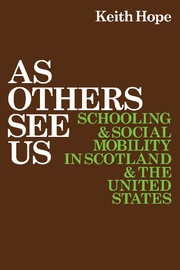Crossref Citations
This Book has been
cited by the following publications. This list is generated based on data provided by Crossref.
Raven, John
1989.
The Raven Progressive Matrices: A Review of National Norming Studies and Ethnic and Socioeconomic Variation Within the United States.
Journal of Educational Measurement,
Vol. 26,
Issue. 1,
p.
1.
Raven, John
1990.
The Barriers to Achieving the Wider Goals of General Education and their Implications for the British Educational Research Association.
British Educational Research Journal,
Vol. 16,
Issue. 3,
p.
273.
Freedman, David
1995.
Rejoinder.
Foundations of Science,
Vol. 1,
Issue. 1,
p.
69.
Freedman, David
1997.
Topics in the Foundation of Statistics.
p.
69.
Sakamoto, Arthur
and
Powers, Daniel A.
2005.
Handbook of Population.
p.
383.
Raven, John
2005.
Liberal Education and Liberalism in Modern Society.
The Good Society,
Vol. 14,
Issue. 3,
p.
29.
Raven, John
2005.
Liberal Education and Liberalism in Modern Society.
The Good Society,
Vol. 14,
Issue. 3,
p.
29.
Paterson, Lindsay
and
Iannelli, Cristina
2007.
Social Class and Educational Attainment: A Comparative Study of England, Wales, and Scotland.
Sociology of Education,
Vol. 80,
Issue. 4,
p.
330.
Sakamoto, Arthur
and
Powers, Daniel A.
2019.
Handbook of Population.
p.
457.
Raven, John
2020.
‘Closing the gap’: Problems with its philosophy and research – A keynote address prepared for BPS Education Section Conference, September 2019.
Psychology of Education Review,
Vol. 44,
Issue. 3,
p.
2.





